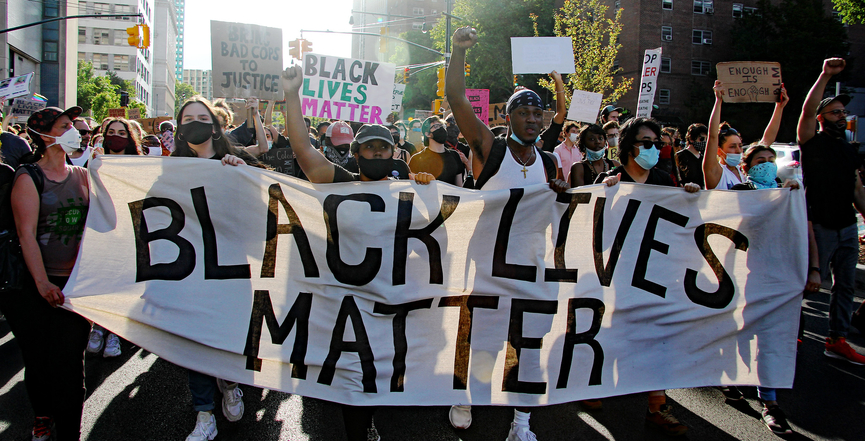Protest against police terror across the United States over the last two weeks is beginning to produce change. George Floyd’s murder by Minneapolis police drove hundreds of thousands, perhaps millions of people into the streets, demanding both justice for Floyd and other victims of the police, and fundamental change to policing itself.
“Defund the Police” is being heard coast to coast from people tired of the cycle of police violence, protest, promised reform, and then … nothing. In Minneapolis, a supermajority of the city council has committed to dismantling the Minneapolis Police Department.
“We haven’t seen a moment like this in at least half a century,” said Harvard professor Khalil Gibran Muhammad, author of The Condemnation of Blackness, speaking on the Democracy Now! news hour, “with protesters taking to the streets to demand, once and for all, not just police reform and accountability, but the prospect of a new vision of a relationship between state authorities and the health of a community.”
In Minneapolis, four officers face prosecution for George Floyd’s murder. But the public wants more than convictions, which, in themselves, are far from certain according to Minnesota’s first African-American attorney general Keith Ellison.
Ellison took charge of the prosecution over concerns that the county prosecutor had a pro-police bias. After decades of impunity, violence against residents, and dismal success solving violent crimes, many in Minneapolis want their police department torn down.
“We’ve got to create a system of public safety that works for everybody,” city council member Jeremiah Ellison said on Democracy Now! He is Keith Ellison’s son, and knows personally about the MPD’s penchant for violence. In 2015, amidst mass nonviolent protests following the police killing of yet another young African-American man named Jamar Clark, an MPD officer pointed a gun at Jeremiah’s head as he held his hands in the air.
“We did a study last year of 911 calls, and we realized that one of the top calls that police make are for what we call emotionally disturbed persons or mental health calls,” Jeremiah Ellison continued. “Do we need a gun present at a call like that? I think that the answer to that is no.”
In New York City, groups have laboured for decades to reform the New York Police Department, with its ever-lengthening list of unarmed Black men killed by its officers: Amadou Diallo, Patrick Dorismond, Ousmane Zongo, Timothy Stansbury Jr., Sean Bell, Ramarley Graham, Eric Garner and the list goes on.
Veteran activist Linda Sarsour helped organize a march in the aftermath of George Floyd’s murder, demanding change. “Over 50,000 people came out with us,” she said on Democracy Now! “Let the cops do what the cops are supposed to do: keep people safe. They are not social workers. They are not mental health professionals. They are not educators … All we’re saying is, decrease their budget, take that money and reappropriate it into youth, seniors, community development, and with a focus on those who have been the most directly impacted, on communities of color, poor working-class people.”
As people have risen up demanding justice for George Floyd and policies to address the enduring plague of racism in the United States, the police, the National Guard, and President Trump and his minions have done everything they can to violently suppress dissent. Activists have been beaten, tear gassed, maced, shot and arrested en masse.
Nonviolent protesters and journalists alike have lost eyes, been rammed by cars and trucks, suffered broken limbs. At a rally in San Jose, California, police shot their own anti-bias trainer in the groin with a rubber-coated steel ball bullet, bursting his testicle. Derrick Sanderlin, a 27-year-old African American, may never be able to father children.
As the tear gas clears, police reform laws are beginning to get passed. Chokeholds have been banned in New York State and Colorado, as well as in Houston and Raleigh, North Carolina. The U.S. House of Representatives is advancing a bill that will ban chokeholds in federal law enforcement. It will also create a national database of violent cops, so a fired officer can’t simply move to a police department in some other city or town.
After George Floyd’s funeral Tuesday, his younger brother, Philonise, flew to Washington, D.C., where he testified before the House judiciary committee: “George wasn’t hurting anyone that day. He didn’t deserve to die over 20 dollars. I am asking you, is that what a Black man’s worth? Twenty dollars? This is 2020. Enough is enough.”
Amy Goodman is the host of Democracy Now!, a daily international TV/radio news hour airing on more than 1,300 stations. She is the co-author, with Denis Moynihan, of The Silenced Majority, a New York Times bestseller. This column originally appeared on Democracy Now!
Image: doug turetsky/Flickr



